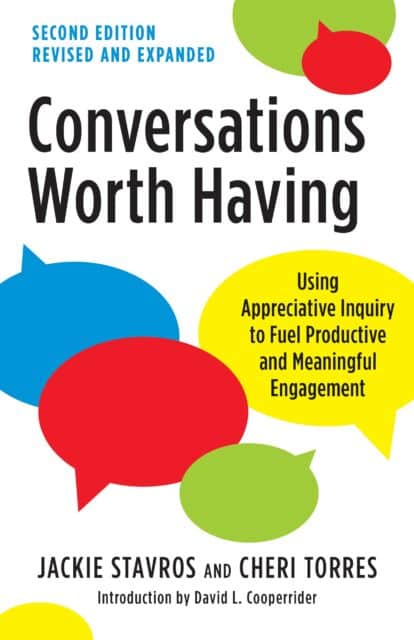In the world of business we often think about strategies, processes, operations, customers, products, and team building. However, there's one often overlooked concept that can literally transform everything. Here's the paradigm shift: By changing the conversations we're having, we can create possibility and unlock human potential for innovation that is truly transformative to any organization. In Conversations Worth Having, Jackie Stavros gives us the secret and it sounds almost too simple, but aren't the best ideas?
Here are the Big Ideas:
-
Words create worlds.
The stories we tell out loud shape what people notice, measure, and act on. As the authors put it, “Conversation is the currency of culture; change the conversation and you change the organization.” -
Two simple practices power extraordinary results.
Positive Framing (choosing what you want more of rather than what you want less of) and Generative Questions (asking open, possibility-oriented questions) turn even a tense status meeting into a lab for innovation. -
It’s rooted in Appreciative Inquiry.
Instead of problem-solving by analysis (what’s broken?), you spark progress by discovery (what’s working and how do we scale it?). That mindset shift is what keeps teams energized rather than drained.
Why entrepreneurs and leaders should care (the evidence)
-
Engagement is tanking, and it’s expensive. Global engagement fell to 21 % last year, draining an estimated $438 billion in lost productivity businessinsider.com. Conversations that reconnect people to purpose are the lowest-cost antidote I know.
-
Poor communication hits the P&L directly. U.S. companies lose $12,506 per employee per year to miscommunication, while 72 % of leaders say strong communication increases productivity go.grammarly.com. Translation: every muddled Slack thread is a hidden tax.
-
Questions are a social technology. A Harvard study found that people who ask more (especially follow-up) questions are viewed as more likable and collaborative reflectionpoint.org. That matters when you’re courting investors, customers, or top talent.
There are two types of conversations we can tend to have within organizations:
1. Conversations Worth Having
These are productive and engaging conversations. They generate energy, connection, and forward momentum. They’re grounded in curiosity, appreciation, and possibility.
They come in two flavors:
➤ Appreciative Conversations
These focus on what’s working, what gives life, and what people value. They amplify strengths and build trust.
Examples:
-
“What are we most proud of from last quarter?”
-
“When have we seen this team at its best?”
-
“What made that client experience exceptional, and how can we replicate it?”
Use appreciative conversations to build morale, uncover best practices, and celebrate wins.
➤ Generative Conversations
These open up new possibilities. They invite imagination, new thinking, and creative solutions.
Examples:
-
“What might be possible if we solved this together?”
-
“What’s the future we want to co-create?”
-
“What’s a bold move we could make that aligns with our values?”
Use generative conversations for innovation, strategy, and future visioning.
2. Conversations Worth Avoiding
These are detrimental to culture and outcomes. They drain energy, create defensiveness, or reinforce limitations.
They typically show up in three ways:
➤ Critical Conversations
Focus on what’s wrong or who’s to blame. They close people off.
Examples:
-
“Why did you screw this up again?”
-
“This team never gets it right.”
These damage trust and motivation.
➤ Despairing Conversations
Emphasize scarcity, helplessness, or victimhood.
Examples:
-
“There’s nothing we can do, the market is too bad.”
-
“Leadership will never change.”
These crush morale and stifle creativity.
➤ Disengaged Conversations
Low energy or distracted. People go through the motions, not meaningfully engaging.
Examples:
-
“Let’s just get through this meeting.”
-
Monosyllabic responses, no eye contact, checking phones.
These are silent culture killers.
A Simple Tool to Use
When you step into a conversation—ask yourself:
Is this conversation creating more possibility, or shutting it down?
That one reflection can shift your tone, your questions, and your impact.
Memorable quotes to share with your team
-
“Change begins the moment a question is asked.”
-
“If you want rapid, transformational change, shift the conversation—not the org chart.”
-
“Positive framing is not cheerleading; it’s strategic focus.”
How to put the book to work by Monday
| Monday | Tuesday | Wednesday | Thursday | Friday |
|---|---|---|---|---|
| Identify one recurring meeting that feels like a slog. | Rewrite the agenda in positive-frame language (e.g., “What progress did we make?” vs. “What went wrong?”). | Come with three generative questions starting with “What if…” or “How might we…”. | Listen for high-energy moments; ask a follow-up “Say more about that.” | Capture the best ideas and decide one next-step action—then celebrate the win publicly. |
The big takeaway
Entrepreneurs often chase the next tool, system, or capital raise. Conversations Worth Having reminds us that the most scalable leverage point is already on payroll: it’s the way we talk to each other. Master the two practices, and you’ll create a culture that magnetizes talent, accelerates learning, and compounds value—one sentence at a time.
